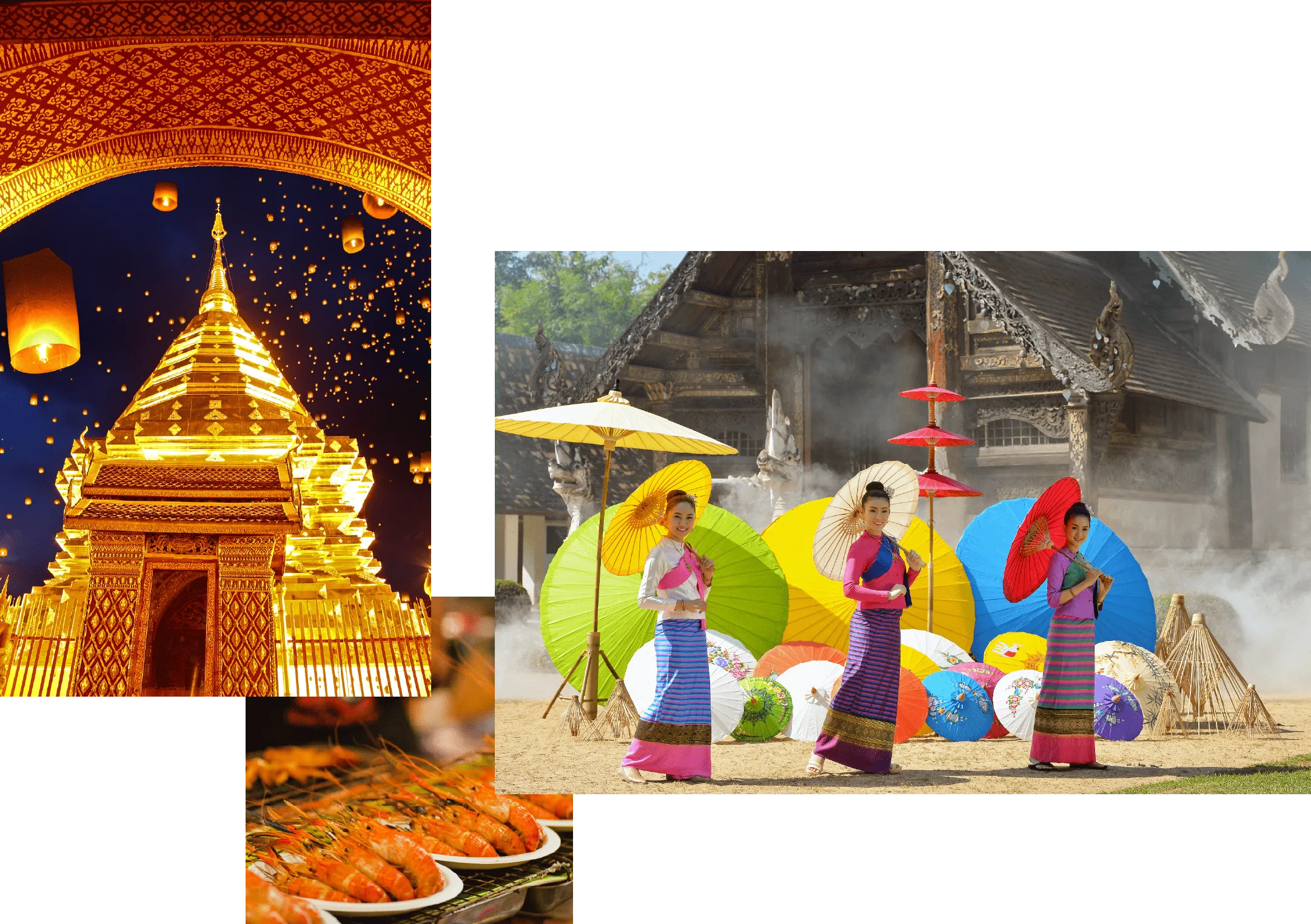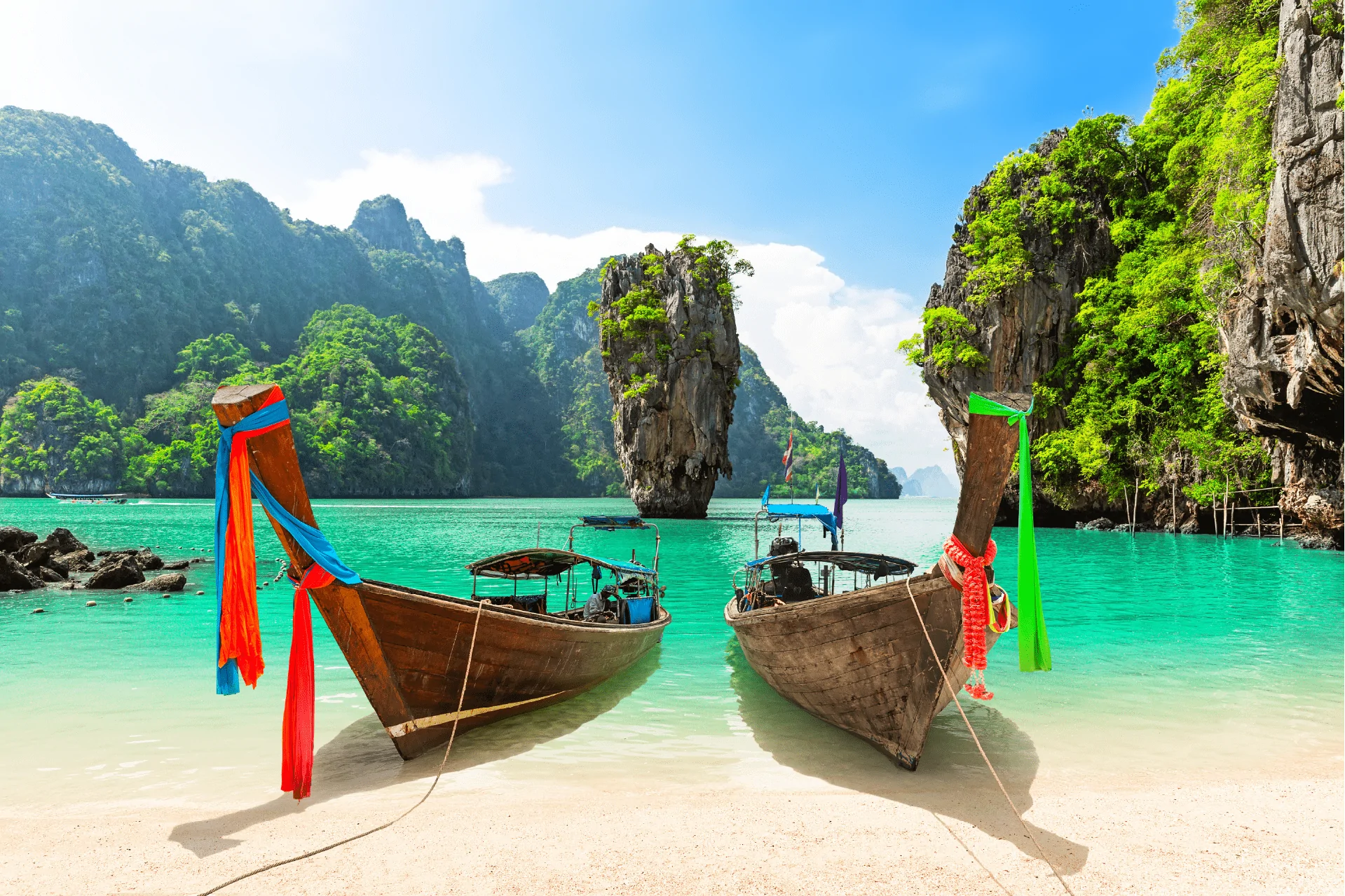
About
Thailand
Overview
Thailand is located in the heart of mainland Southeast Asia, bordering Malaysia to south, the Lao PDR and Cambodia to the east and Myanmar to the north and west. From the tip of the country’s northernmost point to its southernmost point, Thailand spans approximately 1,600 km., and approximately 870 km. from east to west. Thailand has along coastline along the Gulf of Thailand (1,875 km.) and the Andaman Sea (740 km.), containing over 400 magnificent islands, many of which have become popular tourist destinations.
Thailand has long been known as the “Land of the Smiles” for the gentle and welcoming nature of its people, and this charming character has persisted. It has also been known for its rich cultural heritage, and was named the fifth “best country for the cultural heritage influence in 2021” according to a recent report by New York-based CEOWORLD magazine.
Learn more and keep updated about Thailand’s current affairs at the Thailand NOW ! website

Population
and Culture
Thais has a population of approximately 69 million, and is ranked the 20th largest country by population according to UN statistics.
The majority of Thais (over 90 per cent) are Buddhists, other major religions such as Christianity, Hinduism, Islam and Sikhism, are also practiced and celebrated, as the Constitution grants complete freedom of worship to all Thai citizens.
Thailand continues to share its rich cultural heritage with the world, and some of the our cultural traditions which have become well-known include traditional Thai cuisine and Muay Thai (traditional Thai boxing). Popular culture, including Thai cinema (ranging from romantic comedies to horror and the action genres) and Thai pop music have been well received in many parts of East Asia, North America, and Europe. Young Thai creative types also have a strong presence in international visual advertising and cinematic animation.
Read about Thailand’s rich cultural heritage at the
Thailand NOW ! website

World context
Thailand has long played a key role in regional peace, securityand prosperity. It is a founding member and key player in the Association of Southeast Asian Nations (ASEAN); the ASEAN Declaration marking its establishment was signed in Bangkok in August 1967. During the post-Cold War period, Thailand has been pivotal in the establishment cooperationregional economic frameworks such as the BIMSTEC (1995), the Asia-Europe Meeting (1996), the Asia Cooperation Dialogue (2002) and ACMECS (2003).
Bangkok hosts the United Nations Economic and SocialCommission for Asia and the Pacific (ESCAP), as well as over 20 United Nations entities in the country, and celebrates its 75th anniversary of membership in the United Nations in December of 2021.
International business have long recognized Thailand’sstrategic location that provides easy access to the wider ASEAN market of over 660 million people, a favorable investment climate, an entrepreneurial spirit and a welcomingand open society. As such, Thailand has been chosen by many businesses, media firms, as well as international organizations and non-governmental organizations as headquarters for their operations.
Thailand’s has an network of free trade agreements including most recently the RCEP (Regional Comprehensive Economic Partnership), which allows trade access to markets both within and outside of the region. Thailand is also recognized as regional hub for international travel and trade, as well as some industries, most notably the automotive industry and agro-industries.
Follow Thailand’s diplomatic activity on Ministry of Foreign Affairs facebook and twitter feed
Economy

Thailand is Southeast Asia’s second largest economy with a nominal gross domestic product (GDP) of around USD 500 billion. With a free-market economy, Thailand has a strong domestic market and a growing middle class, with the private sector being the main engine of growth. The Thai economy is well integrated into the global marketplace, with exports accounting for over 70 percent of the Kingdom’s GDP.
Thailand also has a strong industrial sector (40 percentof GDP) and a robust and growing services sector (50 percent of GDP) centered on the tourism and financial services industries. Though traditionally an agrarian society and historically one of the world’s few net food exporters, the agricultural sector today accounts for approximately 9 percent of the country’s GDP.
Main exports comprise manufacturing products (74%),
agricultural products (13%),
agro-industrial products (8%),
and mining and others (5%).
Keep updated about Thailand’s economy and business opportunities at the Board of Investment and Eastern Economic Corridor websites
Major manufacturing products are automobiles and automotive parts, computers and components, jewelry, rubber products, plastic pellets, and chemical products. As for agricultural products, Thailand maintains veryhigh rankings in rubber, rice, tapioca, processed chicken and tropical fruit exports globally. Other major export items include frozen seafood products and vegetables. Agro-industrial products include sugar and canned and processed food. Given the importance of exports to Thailand, it has been a leader in the region in terms of trade liberalization and facilitation with the rest of the world.
Thailand and COVID-19
pandemic
Thailand was the first country outside of China to detect a COVID-19 case in January of 2020. The Thai government’s immediate response was to set up a whole-of-government mechanism to detect and prevent transmission of the novel virus. Thanks to existing strong public health system, a massive network of public health village volunteers, and public cooperation, the country’s total number of infections in 2020 was less 4,000 cases, while the pandemic raged throughout the world.
However, Thailand experienced its worst outbreak from April 2021 onwards. Within three months, the number of accumulated cases had jumped to over 300,000 straining the capacity of the public health system. By June 2021, it was confirmed that the more transmissible Delta variant of COVID-19 was prevalent in Thailand, which necessitated the Government to introduce more stringent and targeted measures in Bangkok and surrounding provinces in July 2021. Nevertheless, by October, the COVID-19 situation and fatalities since mid-September from approximately 20,000 cases daily at the height of the latest wave, to a steady decline at under 9,000 cases per day.
The Thai government has initiated massive vaccination programme since the start of 2021, aiming to inoculate at least 70 per cent of the population, or 50 million people, by the end of 2021. Six vaccine suppliers have been approved for emergency use : AstraZeneca, Sinovac, Johnson & Johnson, Moderna, Sinopharm and Pfizer (Sputnik V is recognized for travel into Thailand under the “Sandbox” scheme). Currently, four local vaccines under development by the Government Pharmaceutical Organization, the Faculty of Medicine of Chulalongkorn University, BioNet-Asia Company, and Baiya Phytopharm Company.
Looking forward, the Thai government has adopted a policy for ‘Smart Control and Living with COVID-19’ so that normalcy can return as much (and as soon) as possible. The country is being gradually opened up for international travel, but with necessary health precautions in place, such as requiring full vaccination for reduced quarantine measures, social distancing in public places and services, dissemination of antigen test kits (ATKs) for public use.



Travel
to
Thailand
Beginning on 1 October onward, visitors will no longer be required to present COVID-19 related documents such as the certificate of vaccinationand COVID-19 test result upon arrival in Thailand.
Above policy applies to both Thai nationals and foreign visitors.
Plan your visit to Thailand with the Tourism Authority of Thailand website

